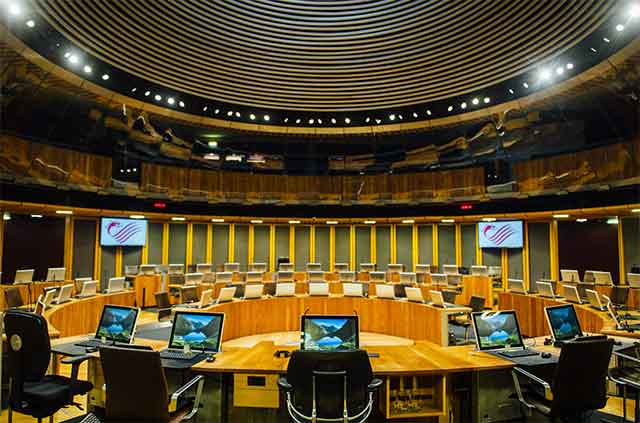A Senedd member recalled her family’s own experience of the devastating impact of flooding as she called for a national resilience plan.
Warning of more frequent monsoon-like rainfall, Carolyn Thomas told the chamber the first time her home was impacted she was woken in the early hours.
She said: “A neighbour wanted to alert me to the fact our pet rabbit had drowned, so we could remove him from the run before our children woke up.
“I was shocked to see a river of water pouring off the highway down our drive, swelling into the garage, and water falling down the steps in the garden, where the force knocked over a brick wall to rejoin the stream at the back of our garden.
“It was devastating for the children and for all of us. And this was because of a blocked culvert on private land further up the road, and it could have been prevented.”
Ms Thomas said it happened again during October’s storms as the culvert was not cleared.
‘Struggling’
She told MSs: “A neighbour has been out of her property for approximately five months now, staying in a hotel over Christmas, nowhere to cook, nowhere to wash up. Her daughter’s a nurse who’s also been struggling, and she’s desperate to have her home back.”
The Labour backbencher, who was elected to represent North Wales in 2021, warned that too often there is confusion and denial of responsibility.
Ms Thomas called for Natural Resources Wales to maintain a register of who owns drainage, ditches, culverts and small water courses, starting with those most impacted by flooding.
She said: “When flooding happens, it happens so quick, it’s often too late to act. The reaction is to call the council for sandbags, the fire service or police.
“Sandbags may help, but it’s often too late, and councils do not have to provide them. Many do not any more – they can’t afford to.”
‘Extremely vulnerable’
Ms Thomas welcomed this week’s announcement of £34m for flood alleviation schemes.
The former deputy leader of Flintshire County Council stressed the importance of maintaining momentum as she warned that the rail network is extremely vulnerable.
She said: “If everybody knew their responsibility – whether it’s landowners or homeowners – under a national flood resilience plan, it could help prevent the devastation of flooding for communities right across Wales.”
Plaid Cymru’s Heledd Fychan called for a national flood forum for Wales, saying it is important to empower and support communities.
She said: “That national conversation is needed, but also that structure to support communities, because not everybody can actually advocate for themselves.”
‘Additional tax’
Llŷr Gruffydd, who represents North Wales, raised the concerns of farmers in the Conwy valley who have been working to repair the Tan Lan embankment.
“Farmers pay into the pot, but they don’t feel that they get a sufficient return,” he said.
His Plaid Cymru colleague Mabon ap Gwynfor similarly warned that farmers face an additional tax for a system that is failing them at the moment.
Mike Hedges, a Labour backbencher, who represents Swansea East, stressed that the water has to go somewhere as he raised the role of an artificial lake alongside the River Tawe.
He highlighted other actions to reduce flooding such as planting trees and shrubs, putting bends in rivers and making sure that culverts are clear.
‘Devastating storms’
Replying to the debate on March 20, Julie James pointed to the Welsh Government’s national strategy on flooding which draws on learning from devastating storms in 2020.
Wales’ climate change minister said she was interested in Heledd Fychan’s idea of a national forum for communities affected by flooding.
Précising a 400-page speech she was handed by officials, she said: “I think you need to make sure it dovetails together and isn’t just a forum to say how unhappy you are.”
Ms James, in potentially her final contribution as climate minister pending a looming reshuffle, said ministers will shortly respond to an independent review on flooding.
She added that the next climate change resilience strategy will be published in October.

